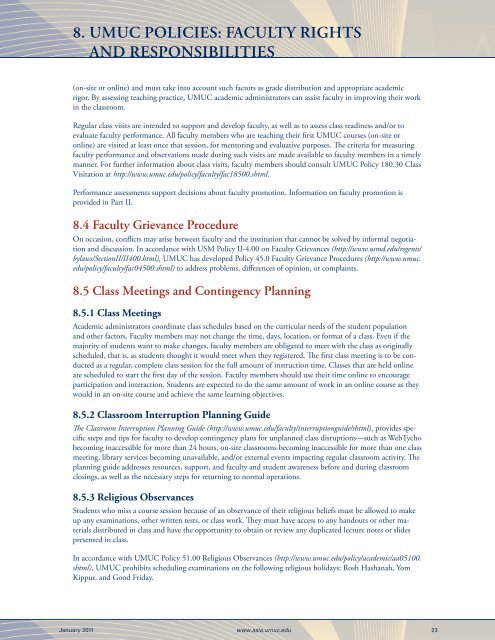Faculty Handbook_Asia_v5 BB.indd - University of Maryland ...
Faculty Handbook_Asia_v5 BB.indd - University of Maryland ...
Faculty Handbook_Asia_v5 BB.indd - University of Maryland ...
Create successful ePaper yourself
Turn your PDF publications into a flip-book with our unique Google optimized e-Paper software.
8. UMUC POLICIES: FACULTY RIGHTSAND RESPONSIBILITIES(on-site or online) and must take into account such factors as grade distribution and appropriate academicrigor. By assessing teaching practice, UMUC academic administrators can assist faculty in improving their workin the classroom.Regular class visits are intended to support and develop faculty, as well as to assess class readiness and/or toevaluate faculty performance. All faculty members who are teaching their first UMUC courses (on-site oronline) are visited at least once that session, for mentoring and evaluative purposes. The criteria for measuringfaculty performance and observations made during such visits are made available to faculty members in a timelymanner. For further information about class visits, faculty members should consult UMUC Policy 180.30 ClassVisitation at http://www.umuc.edu/policy/faculty/fac18500.shtml.Performance assessments support decisions about faculty promotion. Information on faculty promotion isprovided in Part II.8.4 <strong>Faculty</strong> Grievance ProcedureOn occasion, conflicts may arise between faculty and the institution that cannot be solved by informal negotiationand discussion. In accordance with USM Policy II-4.00 on <strong>Faculty</strong> Grievances (http://www.usmd.edu/regents/bylaws/SectionII/II400.html), UMUC has developed Policy 45.0 <strong>Faculty</strong> Grievance Procedures (http://www.umuc.edu/policy/faculty/fac04500.shtml) to address problems, differences <strong>of</strong> opinion, or complaints.8.5 Class Meetings and Contingency Planning8.5.1 Class MeetingsAcademic administrators coordinate class schedules based on the curricular needs <strong>of</strong> the student populationand other factors. <strong>Faculty</strong> members may not change the time, days, location, or format <strong>of</strong> a class. Even if themajority <strong>of</strong> students want to make changes, faculty members are obligated to meet with the class as originallyscheduled, that is, as students thought it would meet when they registered. The first class meeting is to be conductedas a regular, complete class session for the full amount <strong>of</strong> instruction time. Classes that are held onlineare scheduled to start the first day <strong>of</strong> the session. <strong>Faculty</strong> members should use their time online to encourageparticipation and interaction. Students are expected to do the same amount <strong>of</strong> work in an online course as theywould in an on-site course and achieve the same learning objectives.8.5.2 Classroom Interruption Planning GuideThe Classroom Interruption Planning Guide (http://www.umuc.edu/faculty/interruptionguide/shtml), provides specificsteps and tips for faculty to develop contingency plans for unplanned class disruptions—such as WebTychobecoming inaccessible for more than 24 hours, on-site classrooms becoming inaccessible for more than one classmeeting, library services becoming unavailable, and/or external events impacting regular classroom activity. Theplanning guide addresses resources, support, and faculty and student awareness before and during classroomclosings, as well as the necessary steps for returning to normal operations.8.5.3 Religious ObservancesStudents who miss a course session because <strong>of</strong> an observance <strong>of</strong> their religious beliefs must be allowed to makeup any examinations, other written tests, or class work. They must have access to any handouts or other materialsdistributed in class and have the opportunity to obtain or review any duplicated lecture notes or slidespresented in class.In accordance with UMUC Policy 51.00 Religious Observances (http://www.umuc.edu/policy/academic/aa05100.shtml), UMUC prohibits scheduling examinations on the following religious holidays: Rosh Hashanah, YomKippur, and Good Friday.January 2011 www.asia.umuc.edu 23
















